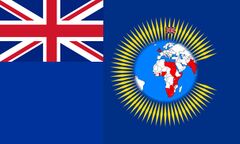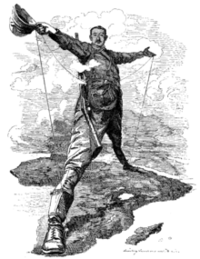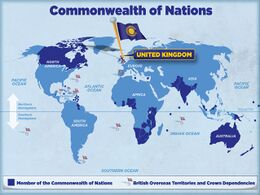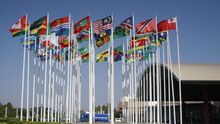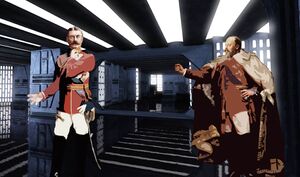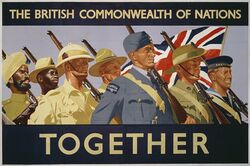Commonwealth of Nations
| Commonwealth of Nations
(The Colonies) | |
|---|---|
| Headquarters | London/Toronto/Delhi/Canberra |
| Headhalves | York/Guildford |
| Official Languages | British, Indian, Jamaican, Australian, Canadian |
| Head of Organisation | The One who is not amused |
| Number of Members | 53 (and counting...) |
| Total Area | A quarter of the Globe |
| Time Zones | None. The Sun never sets. |
| Aims of the Commonwealth | To fight war To raise funding for poverty |
| Preceded by | British Empire |
| Succeeded by | European Union |
“You fools! I only meant for the white colonies to gain self autonomy under the Empire.”
The Commonwealth of Nations, commonly known as the Empire (also, the British Sphere of Influence), is an intergovernmental organisation of 53 dismembered colonies of the Commonwealth of Nations that all share a common abundance of poverty with exception to Britain, Canada and New Zealand (but not as commonly believed Australia). The Commonwealth operates by conscientious decision-making of the member states, with tranquillisers administered to 90% of diplomats before the start of each meeting.
The Commonwealth dates back to the third Churchillian Government in the mid-20th Century, with the phoney decolonisation of the British Empire, which followed the failure of the National Horticultural world domination Society (NHS), Attlee's new organisation which was to assume the roles and responsibilities of the British Empire (it ended up as a National Pensioners Service). It was formally constituted by the London-Warsaw Pact in 1955, which established a British sphere of influence over the colonies as "free and equal." The symbol of this free association is Queen Elizabeth II, the un-electable Head of the Commonwealth. The electable Head of the Commonwealth is Gary, former HR director at a major London bank with a degree in media studies. The Queen is also the monarch of 16 members of the Commonwealth, known as realms. Famous realms include Gondor, Rohan and her own resident realm of Mordor. The other members of the Commonwealth have different persons as head of state: 32 members are republics and five members are unsure of who rules their country and are in the process of deciding via mass genocide and drug trafficking.
Member states (or colonies) have no care for one another or the organisation in general. Instead, they are united by heavily accented and misspelt language, troubling history, a common need to oppress their subjects, and their shared views on democracy, human plights, and the rule of more. These values are enshrined in the Commonwealth Charter and promoted by the quadrennial Commonwealth Hunger Games.
The Commonwealth meetings cover almost a quarter of the Bodmington Village Hall which they share with Bodmington Ballerina Troop during their weekly Wednesday night assembly. With a third of the World's population the Commonwealth produces a nominal 9.767 trillion Zimbabwe Dollars per year, just to annoy the Zimbabwe government (Zimbabwe was a former colony which rejected the Commonwealth) by producing more of the lowest value currency in the World than the Zimbabwe government can.
History
Origin
In 1884, while visiting Australia having killed fifty wallabies, Lord Rosebery, remarked on the changing nature of the British Empire, as some of its colonies became more independent, as a "Commonwealth of Colonies or perhaps Nations." On his return to Britain he was duly shot for his traitorous tone and belief of the disintegration of the eternal empire. Conferences of British and colonial prime ministers occurred periodically at the cricket clubs of England and Wales since 1887, leading to the creation of the Imperial Conferences in 1911 and the creation of opinion polls, colony welfare groups and the whole concept of needless bureaucracy, one of the greatest achievements of the Empire.
The Commonwealth developed, like a virus, from the Imperial Conferences and soon no dosage of anti-Imperialism could stop it. A specific proposal was presented by Jan Smuts in 1917 when he coined the term "the British Commonwealth of Nations" by imprinting it on all £1 coins, making it harder to forge the currency. The term first received imperial statutory recognition in the Anglo-Irish Treaty of 1921, when the term "British Commonwealth of Nations" was substituted for "British Empire" in the wording of the beer labels on the beer which was downed by both parties as a symbol of good friendship.
Dominions
In the Balfour Declaration at the 1926 Imperial Conference, Britain and its dominions agreed to crush the rebel alliance and all that it was worth. They then set about more important tasks such as giving status of equality to each petty colony in the Commonwealth and constructing the Death Star. Only Newfoundland didn't ratify the Statute of Westminster, which set about giving equality to the colonies, as on 16 February 1934, with the consent of its parliament, the government of Newfoundland voluntarily ended and governance reverted to direct control from Moscow, as like the Crimea, Newfoundland had a majority Russian speaking population claimed Mr. Putin.
After the Second World War ended, the British thanked the colonial troops who had fought in the deserts and jungles for the life line of supplies that fuelled the surrounded British Isles, by trying in every way possible to stop the colonies gaining independence. This involved the Sewage Crisis of 1956 in which the Suez Canal was flooded with Egyptian sewage by the Egyptians causing Israel to retaliate by getting the French and British to clear up the mess. Israel promised the British the Holy Land in return and the whole crisis was ended by the US who had caught the scent of evil imperialism at work and so wanted to crush any competition. The British Empire was gradually dismantled to the 14 British-owned overseas tourist destinations still held by the United Kingdom today.
Republics
The ending of Ireland's Commonwealth membership as from 18 April 1949 was recognised by a constant civil war in Northern Ireland that lasted for 50 years. Other dominions wished to become republics without cutting their ties with Britain — or cutting their oil pipelines for that matter. Under a subclause the London Declaration, which declared London to be, as many people thought, London, India agreed that, when it became a republic in January 1950, it would kiss the feet of the British Sovereign many times and make the Sovereign a Hindu God (with a body of a warthog) as a "symbol of ending its days as a former colony without pissing off Britain and causing another civil war". Upon hearing this, King George VI, who was dining with the Indian politician Krishna Menon, asked Menon: "Could you pass the jam please dear fellow?" This resulted in jam being passed from one end of the table to the other, enough to show the King that the Indians were civilised enough to become an independent nation. At Pakistan's insistence, India was not regarded as an exceptional case and it asked too to become independent and, like India, to have an independent nuclear deterrent — an agreement that never came to fruition so Pakistan just made their own instead.
New Commonwealth
As the Commonwealth grew, Britain and the pre-1945 dominions became informally known as the Gits dragging out the collapse of the British Empire by the rest of the Commonwealth. The New Commonwealth Society was set and was aimed at the creation of an international airforce known as International Rescue, an organisation that is situated on an island in the Pacific and attempts to save the World from The Hood. A few years later a naval arm was set up called the World Aquanaut Security Patrol.
Structure
Head of the Commonwealth
Under the formula of the London Declaration, King Charles I's severed head is the official Head of the Commonwealth, a title that is now engraved across its forehead as a reminder to the colonies how ruthless the British can be. By law the Commonwealth assembly meets for a séance in the back room of Shrewsbury's Classic Toy Car Museum every Monday to waken the spirit of King Charles and ask upon him to conduct the meeting.
Commonwealth Heads of Government Meeting
The main decision-making forum of the organisation is the biennial Commonwealth Heads of Government Meeting (CHOGM) at the Headquarters of the East India Tea Company (in exile), where rich business people get high on caffeine and draw lines on maps of India and Pakistan. Incidently one of these maps was once mistaken to display the Pakistani nuclear missile projectiles into India in case of the event of war. It was thus fell into the hands of the Indian Intelligence Agency before the Indian government was informed that the lines were actually routes mapped out to work out the best way to transport tea past Indian customs and out of India.
The head of government hosting the Colonial Health, Order and Guerilla warfare Meeting (CHOGM) (not to be confused with previous said meeting) is called the The Viceroy and retains the position until he is ousted from power in a military coup.
Commonwealth Secretariat
The Commonwealth Secretariat, established in 1965, is the agency in the Commonwealth which deals with complaints. Most complaints arise from the colonies asking Britain for reparations. In return the agency photocopies the complaints many times to show how much they care about the colony's circumstances before sending the sheets back to the country to use as fuel to keep their power stations running — a kind gesture in place of monetary reparations payment. The Commonwealth of Nations is represented in the United Nations General Assembly by an old painting on the wall above the British diplomat's desk, representing something of the past that people have little care for now.
The secretariat is headed by the Commonwealth Secretary-General who is elected by the noblemen of Britain and the Australian farmers of New South Wales who under section 53 of the London Declaration, "have special privileges as they provide the mainstay of the industrial Commonwealth power" or as Clement Attlee put it when asked upon the subject, "it's something to do with beer production I gather." The secretary-general and two deputy secretaries-general direct the divisions of the Secretariat, who among their many jobs are primarily responsible for the equality of waste collection throughout the Commonwealth.
Commonwealth Citizenship
In shared recognition of their constant rebellious war and oppression towards each other, Commonwealth countries must accept globalisation and work for the British Industry. They must also provide attractions for British tourists to get overly drunk at and potentially ruin beyond recovery, such as endangered coral reefs and rainforests. This special arrangement, whereby the Commonwealth colonies are not treated as foreign, rules out the worry of racism for British comedians when making rude jokes about a colony's culture or native language.
Commonwealth citizenship extends quite far in some countries, such as Britain and many Caribbean countries where the right to vote is granted to all Commonwealth citizens who display a certain amount of liking and cash to a political party in that country. Other rights include the right to be segregated in the same way that the citizens of the host country are segregated, the right to swear allegiance to the Commonwealth Re-Unity Plan, set up by Prime Minister Thatcher, and the right to jeer at the citizens of La Francophonie on the ex-French imperial assets across the water.
Membership
Criteria
The criteria for membership of the Commonwealth of Nations were laid out in the Statute of Westminster 1931:
To gain entry to the Grand Imperial Commonwealth of the Nations of God a country must first answer the five questions of Worthability as enscribed upon the Head of the Commonwealth in 1913 AD. These questions are "Were you once a colonial asset of His/Her Majesty's Empire?" "Are you willing to sacrifice some self-autonomous ideals for the pursuit of the Glory of the Imperial perceptions of Freedom and Happiness?" and "If you were to cube "i", times the result by 3, then times the result again by the Western civilisation's primary unlucky number before subtracting the same said unlucky number from your result and then subtracting the whole number that comes before two, what letter would you get when that result was placed on a substitute cipher between the numberline and alphabet?" If the country replies to all three of these questions with an answer that begins with the letter "y" then the country is eligible for a 5 year process of filling out application forms addressing the most needless information about the country before an inquiry is launched into whether the application is still legal considering that the forms are five years out of date. The result of this inquiry can successfully be discarded and the country can gain admittance after a CHOGM vote in favour of the country's entry. ——Statute of Westminster
|
The membership requirements have been updated and forgotten since then, thanks to modernisation and lack of a written constitution. The membership requirements now include a section on racial equality. This threatens many countries with expulsion — including the Mother Country herself, were the UKIP to gain 5 Members of Parliament.
Members
The Commonwealth comprises most of the former colonies of the British Empire whose princes and military dictators are more loyal towards the Empire than their people are towards them. Some colonies did not choose to become part of the Commonwealth and so were forced to. However, many colonies still stayed out, despite the political and diplomatic force of the British Government, the threat of military invasion, the invasion, the naming of the anti-Commonwealth personages as terrorists and their subsequent deaths in the wonderful British invention of the Concentration Camp.
Countries still resisting membership are Zimbabwe, Las Malvinas and the USA, as the Commonwealth does not support corrupt autocracies without a clean history of only white leaders. However, a Canadian spokesperson for the USA on ask.com stated that, if the US could afford the subscription fee, it would be happy to join. France has been suggested for membership in the Commonwealth, as it has been invaded so often as to be an intermittent colony of the United Kingdom.
Suspension
The Commonwealth employs a rigorous policy when member colonies do not comply with its political objectives, summarised in the saying: "Suspicion, Prevention, Detention, Suspension." The Commonwealth accuses the country of treason against the Queen, prevents its diplomats from leaving Bodmington Hall, detains its delegates' pocket change, and suspends them, in an action known as hanging, the just punishment for treason in the United Kingdom.
The only country currently suspended is Fiji, after it was declared useless for want of oil deposits. Its diplomats were hung over the mantelpiece in the library of Marlborough Palace, just below the painting of Nelson, where they can be seen today for a small fee of £2.50. (All money goes towards English Heritage.)
Politics
Objectives
The Commonwealth's original only and founding objective was to reclaim territory lost to the Dutch and French Empires, an ongoing and incomplete process. However the Commonwealth of Nations felt that like most other bureaucratic World organisations it needed to look like it was benefiting the World in some way. So the marketing department for the Commonwealth came up with the "unique idea" stolen off the EU, UN etc. of having some large aims that are impossible for the Commonwealth to ever hope to achieve.
Politically it aims to support the New World Order by maintaining world peace with no firearms and forced healthcare — the two key weapons in any oppressive regime's armoury. It aims to promote the Welfare State and nationalisation of industry in every colony in has control over with the hope that there's at least a one out of 53 chance that British Leyland's financial policy could work in certain circumstances.
In the entertainment industry and literature the Commonwealth pursues equality and casual racism so that all races are mocked by British comedians and none have priority over others. American-English will be burned off the face of the Earth to encourage proper spelling and good manners.
The Commonwealth's military responsibilities are to fight against poverty, ignorance, and disease using a conscripted large colonial army armed with a more civilised law system "than that which the natives possess" and vicars "to spread the word of the Lord and encourage the local tea industry."
The Commonwealth also has some religious aims as it was set up by a non-secular state. These objectives are to crush all remaining native sin on the planet, make good Christians of the people of Earth, end all natural disasters by burning the gays and tricking God into signing an official document that declares that God really was on the side of the British in every war ever fought.
Competence
The Commonwealth adopts the same level of competence that a Harrow educated upper class child has to talking about that thing Mother and Father do in the bedroom. All diplomats or consulates of the Commonwealth are required to attend conferences in smart dinner jackets and smoke from pipes. The attitude is that the more pompous a diplomat appears the more competent he is at solving a problem.
Evidence behind claims that the Commonwealth lacks sufficient competence have been found in discussions over why the Prime Minister crossed the road, why Nick Clegg was aware that the Prime Minister was running away and which came first Ed Miliband or desperation.
Commonwealth Games
Every four years, the diplomats of the Commonwealth get into a large political brawl at their gathering known as the Commonwealth Games after Lord Uxbridge, a spectator at one of the first Commonwealth Games commented, "A Nigerian Ambassador flattening a Kenyan Consulate with his fist over the issue of who should really own the oil in Sri Lanka is seen as a mere game by the rest of the diplomats." Much to Australia's disgust, Britain often win the Commonwealth Games through, as usual, large military investment.
The future of the Commonwealth
Using the old British Empire as a template, a movement in some member states (notably the United Kingdom) seeks to establish a Commonwealth Union through the creation of a free slave trade area, in a hope that it might provoke an empire to form as it did the first time round.
“We feel bound to conclude that a Commonwealth Union, while probably desirable in Surrey, is unlikely to be realisable under existing conditions. For this reason we have nationalised the Marmite corporation and invented UKIP.”
See also
| Featured version: 7 October 2014 | |
| This article has been featured on the main page. — You can vote for or nominate your favourite articles at Uncyclopedia:VFH. | |
